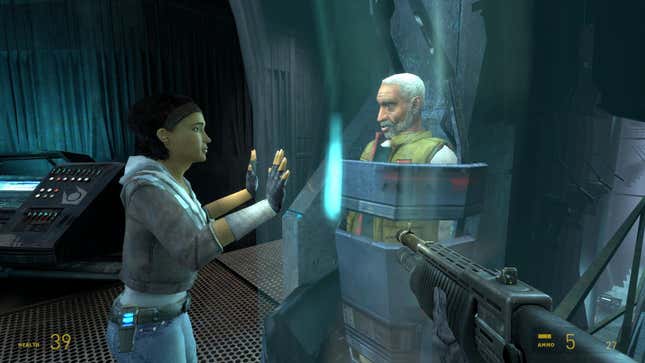In a recent interview with Games Industry.biz, Ken Levine disparaged his most famous and popular game, BioShock, as “a very, very long corridor.” He uses this description pejoratively to distinguish the 2007 first-person mystery game from his current project, science fiction FPS Judas, a game he says is being made “very, very differently.” He wants, as a consequence of this, for Judas to be “much more…reflective of players’ agency.” But I want to step in and argue for the corridor, for why the contemporary widespread abandoning of them has allowed some of the most compelling aspects of gaming to become lost.
Before we get in the weeds, what does Levine, and indeed everyone else, mean by a “corridor”? It’s the notion that there’s only one core route through a game, a pre-determined path down which all players must tread, where we do not have the freedom to pick our own directions. As such, looking back from our current era in which open-world games dominate the AAA landscape, this can give the appearance of a design that removes or restricts player agency to a deletory result.
And to be incredibly clear, some corridors did just that. While first-person games were born in level-based mazes (Return to Castle Wolfenstein, Doom, etc), there did come a wake of games that were almost literal corridors, so ridiculously restrictive that it felt like being dragged down their inevitable tunnel by your nostrils, shoulders scraping the claustrophobic walls all the way. To name names, the very worst of these were the Call of Duty campaigns from Black Ops onward—games that killed you if you dared to walk left or right, rather than straight on, and pushed you to the back to watch the NPCs play the game for you.
But I would argue that almost no one who played BioShock in 2007 reacted by saying, “Damn, that was just a corridor.” Because it was a game that, despite having only one core pathway, allowed players to feel an enormous sense of freedom. You chose huge amounts in BioShock, from how you actually played (run-and-gun shooter, device-based trapping and stealth, immersive sim), to how you responded to the nature of the world around you, not least in how you treated the Little Sisters. People celebrated the game for the amazing amount of freedom it offered within such a tightly scripted narrative, and all of that is to ignore that the game being a prescribed corridor was the entire point.
Sorry to spoil an 18-year-old game, but the fact that you had no choice but to follow the instructions you were given was the massive third-act reveal. That the game was set in an inescapable corridor is so much of why BioShock was brilliant, because if it had let players visit any point in the underwater city of Rapture whenever they wanted, everything else about it would have fallen apart.
BioShock’s drama so often depends on you being exactly where the game designer wants you to be, at exactly the moment they want you there, and that kind of precise narrative choreography is the result of a corridor. By rejecting such game design as a failure, we’re losing this kind of experience, and I really believe it’s something we should instead be fighting to save.

Of course corridors are, and should be, only a part of games. I’m not silly, I love a fantastic open-world game, and of course have been playing RPGs since the 1980s that offer vast amounts of player freedom when approaching their worlds. I’m not for a moment arguing for anything more than a desire to preserve the corridor as an option among so much else, and therefore not to disparage it as if a failure of the past. Because damn, it brought so much success.
I don’t think I’m necessarily being that huge of a maverick here. In fact, if you look at any number of “all time best games” lists, and adjust for recency bias, there are certain names that come up again and again: Half-Life 2, Deus Ex, Quake 2, Halo, Dishonored. They share space on those lists with games that do quite the opposite, the litany of wonderful RPGs that often eschew corridors entirely, but those games with straight paths undeniably dominate. Indeed, they are the shining examples of how to hide the corridor in the best possible ways.
But rather than getting into the nitty-gritty of how and why disguising the corridor was key to their success, let’s focus more on what’s being lost without them.

Open worlds are great, and I’m very happy to be clearing up icons in an Ubisoft map or picking my own unique route through the acts of Baldur’s Gate 3. But what they cannot do as well is puppeteer the player, creating deliberate, narrative moments on a deliberate, narrative path. They cannot offer something more akin to the scenes of a movie, where the impact of event B is so much more meaningful because it came directly as a response to the action of event A, and the consequence of this drives the emotional resonance of event C.
I remember, in the early 00s, at the beginning of the rejection of corridor gaming as a design choice, responding with the same argument that springs to mind now: “Do you reject having to read the pages of a book in order? Is the book a failure if page 37 comes after page 36 every time?” To which the immediate counter is, “Games aren’t books, that’s why we call them something else,” and sure, but my point is: games can aim to be like books in some of the best ways. Because, when your game is set in a corridor, when the scenes are as inevitable as the pages of the book, it’s how we interact with them that defines them. It places the emphasis on our own personal interpretation of what we’re offered, and rather than being a sandbox in which we can play god, we’re instead inside a story which we have the means to uniquely experience.
(In fact, this is the basis for why I’ve argued that the end of Mass Effect 3 is not a failure to recognize player agency, but instead a scripted moment understood uniquely based on your personal experiences accrued across all three games.)
Agency can be wonderful, but it is often at a cost—the cost of a curated, directed, deliberate narrative experience. And yes, it wouldn’t be a good thing if all games were that, but it’s no better to look down upon it as an anachronistic shortcoming of game design. BioShock only worked because it was a corridor, and indeed was a thesis on the corridor, making it all the more odd of a game to throw under the bus of history. There’s value in experiencing a curated, pre-determined tale, boosted by our unique approaches born of how we turn those pages. I don’t want it to be lost, in the name of boasting “greater player agency.”
.






(1)-300x270.jpg)
















